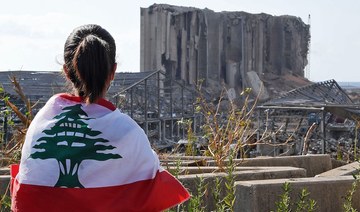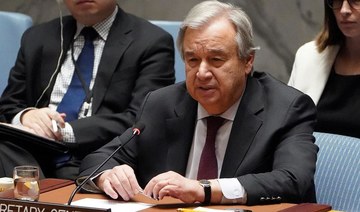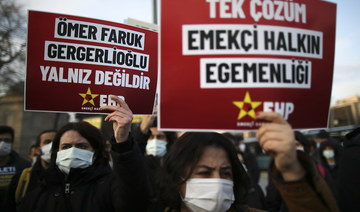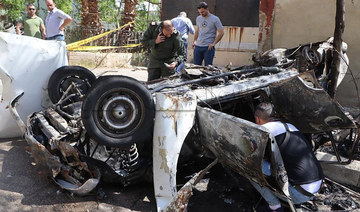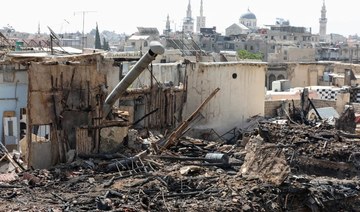QARTABA, Lebanon: Three firefighters. One Lebanese family. The same restless wait. Rita Hitti has not slept a wink since the Beirut port blast, when her firefighting son, nephew and son-in-law went missing.
“In one piece or several, we want our sons back,” she told AFP from the Hitti family’s home in the mountain town of Qartaba, north of Beirut.
“We have been waiting for the remains for six days,” she added, dark circles under her eyes.
Najib Hitti, 27, Charbel Hitti, 22 and Charbel Karam, 37, all relatives, left together in one firetruck to douse a port blaze believed to have sparked the August 4 mega-blast that killed 160 people and wounded at least 6,000 others across town.
They were among the first rescuers at the scene. They have not been heard of since.
Near the entrance to their Qartaba home, the three men are praised as “heroes” in a huge banner unfurled over a wall.
The double exposure shot shows them in the foreground dressed sharply in suits.
In the background, the blast’s now-infamous pink plume rises above their heads as they try to douse a fire.
An eerie calm filled the stone-arched living room, where dozens of relatives and neighbors gathered around Rita, the mother of Najib Hitti.
The women were mum, the men whispered between themselves, the young shuffled in and out of the room, quietly.
Karlen, Rita’s daughter, looked among the most sombre, with her husband Charbel Karam, brother Najib and cousin Charbel all missing.
Sitting next to her mother on the couch, she fought back tears and did not say a single word.
The Hittis’ hopes of seeing their loved ones alive have dimmed since the army on Sunday said it had concluded search and rescue operations with little to no hope of finding survivors.
The health ministry has said the number of missing stands at less than 20, while the army announced it had lifted five corpses from beneath the rubble.
A large blaze was still ripping through the blast site when the Hittis and other relatives of port employees dashed to the disaster zone to check on their loved ones.
But they were stopped by security forces.
“I told them I would know my boys from their smell,” Rita said she told an officer who barred her from the site.
“Let me enter to search for them and when I whiff their smell I will know where they are,” the mother said she pleaded.
Ever since, her hopes have gradually dwindled, but her anger is boiling.
Lebanese authorities have pledged a swift investigation but the exact cause of the blast remains unclear.
Authorities say it was triggered by a fire of unknown origin that broke out in a port warehouse where a huge pile of highly volatile ammonium nitrate fertilizer had been left unsecured for years.
Whatever the cause of the fire was, the popular consensus is that the blame rests squarely on the shoulders of officials in charge of the port as well those who have ruled Lebanon country for decades.
“We gave them heroes and they returned them to us as ‘martyrs’,” Rita said, scoffing at the label officials have used to brand blast casualties.
“What martyrs? What were they protecting? The noxious things (authorities) were hiding in the port?” she asked rhetorically.
“They are martyrs of treachery.”
George, father of Charbel Hitti, also rushed to the blast site to look for his son and relatives after the explosion.
“I started to scream their names: Najib, Charbel... I was like a mad man,” he told AFP.
“We waited until 6 in the morning the next day for clues to what happened,” he said.
“In the end, I started crying.”
He did manage, however, to get one piece of information from a port security official close to the family who was at the scene of the blaze when the firefighting team first arrived on August 4.
The security official had told him that the firefighters were trying to break open the door to the ammonium nitrate warehouse because they could not find the keys before the explosion ripped the whole place apart.
A week has since passed and George said hopes of finding the three men alive have faded.
Assuming they are dead, George said he now wants one thing: “We just want DNA test results that are compatible with those of Charbel, Najib and Charbel,” he said.
“Imagine. This is everything we now wish for.”
Lebanon family restless as it awaits missing ‘heroes’
https://arab.news/rmbtr
Lebanon family restless as it awaits missing ‘heroes’
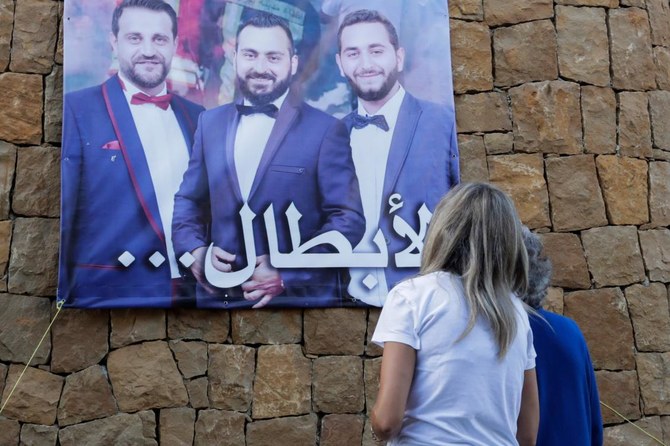
- Najib Hitti, 27, Charbel Hitti, 22 and Charbel Karam, 37, all relatives, left together in one firetruck to douse a port blaze believed to have sparked the August 4 mega-blast
- The Hittis’ hopes of seeing their loved ones alive have dimmed since the army on Sunday said it had concluded search and rescue operations with little to no hope of finding survivors
Hamas sending delegation to Egypt for further ceasefire talks in latest sign of progress

- After months of stop-and-start negotiations, the ceasefire efforts appear to have reached a critical stage
- Question remains whether Israel will accept end to war without reaching its stated goal of destroying Hamas
BEIRUT: Hamas said Thursday that it was sending a delegation to Egypt for further ceasefire talks, in a new sign of progress in attempts by international mediators to hammer out an agreement between Israel and the militant group to end the war in Gaza.
After months of stop-and-start negotiations, the ceasefire efforts appear to have reached a critical stage, with Egyptian and American mediators reporting signs of compromise in recent days. But chances for the deal remain entangled with the key question of whether Israel will accept an end to the war without reaching its stated goal of destroying Hamas.
The stakes in the ceasefire negotiations were made clear in a new UN report that said if the Israel-Hamas war stops today, it will still take until 2040 to rebuild all the homes that have been destroyed by nearly seven months of Israeli bombardment and ground offensives in Gaza. It warned that the impact of the damage to the economy will set back development for generations and will only get worse with every month fighting continues.
The proposal that US and Egyptian mediators have put to Hamas -– apparently with Israel’s acceptance — sets out a three-stage process that would bring an immediate six-week ceasefire and partial release of Israeli hostages, but also negotiations over a “permanent calm” that includes some sort of Israeli withdrawal from Gaza, according to an Egyptian official. Hamas is seeking guarantees for a full Israeli withdrawal and complete end to the war.
Hamas officials have sent mixed signals about the proposal in recent days. But on Thursday, its supreme leader, Ismail Haniyeh, said in a statement that he had spoken to Egypt’s intelligence chief and “stressed the positive spirit of the movement in studying the ceasefire proposal.”
The statement said that Hamas negotiators would travel to Cairo “to complete the ongoing discussions with the aim of working forward for an agreement.” Haniyeh said he had also spoken to the prime minister of Qatar, another key mediator in the process.
The brokers are hopeful that the deal will bring an end to a conflict that has killed more than 34,000 Palestinians, according to local health officials, caused widespread destruction and plunged the territory into a humanitarian crisis. They also hope a deal will avert an Israeli attack on Rafah, where more than half of Gaza’s 2.3 million people have sought shelter after fleeing battle zones elsewhere in the territory.
If Israel does agree to end the war in return for a full hostage release, it would be a major turnaround. Since Hamas’ Oct. 7 attack stunned Israel, its leaders have vowed not to stop their bombardment and ground offensives until the militant group is destroyed. They also say Israel must keep a military presence in Gaza and security control after the war to ensure Hamas doesn’t rebuild.
Publicly at least, Israeli Prime Minister Benjamin Netanyahu continues to insist that is the only acceptable endgame.
He has vowed that even if a ceasefire is reached, Israel will eventually attack Rafah, which he says is Hamas’ last stronghold in Gaza. He repeated his determination to do so in talks Wednesday with US Secretary of State Antony Blinken, who was in Israel on a regional tour to push the deal through.
The agreement’s immediate fate hinges on whether Hamas will accept uncertainty over the final phases to bring the initial six-week pause in fighting — and at least postpone what it is feared would be a devastating assault on Rafah.
Egypt has been privately assuring Hamas that the deal will mean a total end to the war. But the Egyptian official said Hamas says the text’s language is too vague and wants it to specify a complete Israeli pullout from all of Gaza. The official spoke on condition of anonymity to talk about the internal deliberations.
On Wednesday evening, however, the news looked less positive as Osama Hamdan, a top Hamas official, expressed skepticism, saying the group’s initial position was “negative.” Speaking to Hezbollah’s Al-Manar TV, he said that talks were still ongoing but would stop if Israel invades Rafah.
Blinken hiked up pressure on Hamas to accept, saying Israel had made “very important” compromises.
“There’s no time for further haggling. The deal is there,” Blinken said Wednesday before leaving for the US
An Israeli airstrike, meanwhile, killed at least five people, including a child, in Deir Al-Balah in central Gaza. The bodies were seen and counted by Associated Press journalists at a hospital.
The war broke out on Oct. 7. when Hamas militants broke into southern Israel and killed over 1,200 people, mostly Israelis, taking around 250 others hostage, some released during a ceasefire on November.
The Israel-Hamas war was sparked by the Oct. 7 raid into southern Israel in which militants killed around 1,200 people, mostly civilians, and abducted around 250 hostages. Hamas is believed to still hold around 100 hostages and the remains of more than 30 others.
Since then, Israel’s campaign in Gaza has wreaked vast destruction and brought a humanitarian disaster, with several hundred thousand Palestinians in northern Gaza facing imminent famine, according to the UN More than 80 percent of the population has been driven from their homes.
The “productive basis of the economy has been destroyed” and poverty is rising sharply among Palestinians, according to the report released Thursday by the United Nations Development Program and the Economic and Social Commission for Western Asia.
It said that in 2024, the entire Palestinian economy — including both Gaza and the West Bank -– has so far contracted 25.8 percent. If the war continues, the loss will reach a “staggering” 29 percent by July, it said. The West Bank economy has been hit by Israel’s decision to cancel the work permits for tens of thousands of laborers who depended on jobs inside Israel.
“These new figures warn that the suffering in Gaza will not end when the war does,” UNDP administrator Achim Steiner said. He warned of a “serious development crisis that jeopardizes the future of generations to come.”
Israel builds ‘cyber dome’ against Iran’s hackers

- Israeli cybersecurity agency had thwarted around 800 significant attacks since the Oct. 7 Gaza war erupted
- But some attacks could not be foiled, including against hospitals in which patient data was stolen
TEL AVIV: Israel’s Iron Dome defense system has long shielded it from incoming rockets. Now it is building a “cyber dome” to defend against online attacks, especially from arch foe Iran.
“It is a silent war, one which is not visible,” said Aviram Atzaba, the Israeli National Cyber Directorate’s head of international cooperation.
While Israel has fought Hamas in Gaza since the October 7 attack, it has also faced a significant increase in cyberattacks from Iran and its allies, Atzaba said.
“They are trying to hack everything they can,” he told AFP, pointing to Hamas and Lebanon’s Hezbollah movement but adding that so far “they have not succeeded in causing any real damage.”
He said around 800 significant attacks had been thwarted since the war erupted. Among the targets were government organizations, the military and civil infrastructure.
Some attacks could not be foiled, including against hospitals in the cities of Haifa and Safed in which patient data was stolen.
While Israel already has cyber defenses, they long consisted of “local efforts that were not connected,” Atzaba said.
So, for the past two years, the directorate has been working to build a centralized, real-time system that works proactively to protect all of Israeli cyberspace.
Based in Tel Aviv, the directorate works under the authority of the prime minister. It does not reveal figures on its staff, budget or computing resources.
Israel collaborates closely with multiple allies, including the United States, said Atzaba, because “all states face cyber terrorism.”
“It takes a network to fight a network,” he said.
Israel’s arch foe Iran is “an impressive enemy” in the online wars, said Chuck Freilich, a researcher at the Institute for National Security Studies, which is affiliated with Tel Aviv University.
“Its attacks aim to sabotage and destroy infrastructure, but also to collect data for intelligence and spread false information for propaganda purposes,” he said.
Iran has welcomed Hamas’s October 7 attack on Israel, which resulted in the deaths of 1,170 people, mostly civilians, according to an AFP tally based on Israeli official figures.
Israel’s retaliatory offensive against Hamas has killed at least 34,596 people in Gaza, mostly women and children, according to the Hamas-run territory’s health ministry.
Regional tensions have soared, particularly after Iran for the first time fired hundreds of missiles directly at Israel last month in retaliation for a deadly Israeli air strike on the Iranian consulate in Damascus.
It was the most dramatic escalation yet after a years-long shadow war of killings and sabotage attacks between Israel and Iran.
Freilich argued in a study published in February that Iran was relatively slow to invest in cyberwarfare, until two key events triggered a change.
First, its leaders took note of how anti-government protesters used the Internet as a tool to mobilize support for a 2009 post-election uprising.
In the bloody crackdown that crushed the movement, Iran’s authorities cut access to social media and websites covering the protests.
Then, in September 2010, a sophisticated cyberattack using the Stuxnet virus, blamed by Iran on Israel and the United States, caused physical damage to Tehran’s nuclear program.
Freilich said the attack “demonstrated Iran’s extreme vulnerability and led to a severe national shock.”
Since then, Iran has gained substantial expertise to become “one of the most active countries in cyberspace,” he said
While Israel is considered a major cyber power, Iran was only likely to improve, said Freilich.
He pointed to assistance from Russia and China, as well as its much larger population and an emphasis on cyber training for students and soldiers alike, adding that the trend was “concerning for the future.”
Atzaba insisted that the quantity of hackers is secondary to the quality of technology and the use it is put to.
“For the past two years, we have been developing a cyber dome against cyberattacks, which functions like the Iron Dome against rockets,” he said.
“With cyber dome, all sources are fed into a large data pool that enables a view of the big picture and to invoke a national response in a comprehensive and coordinated manner.”
The Israeli system has various scanners that continuously “monitor Israeli cyberspace for vulnerabilities and informs the stakeholders of the means to mitigate them,” he said.
Israel’s cyber strength relied on close cooperation between the public, private and academic sectors, as well as Israel’s “white hat” hackers who help identify weaknesses.
“We work hand in hand,” he said.
Kurds deny torturing detainees in north Syria camps
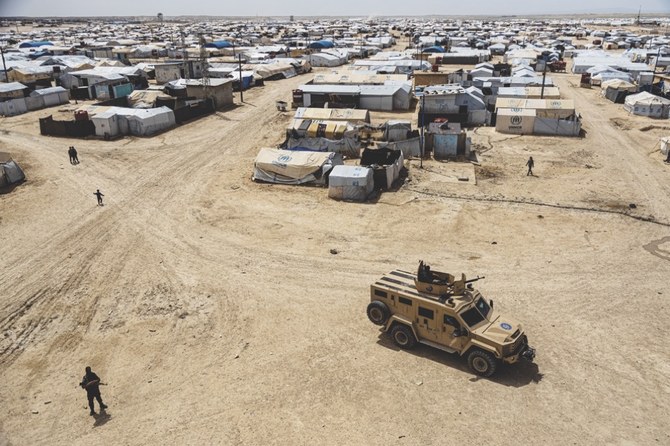
- Rights group alleges cruelty against Daesh militant prisoners and their families
JEDDAH: Kurdish authorities in northeast Syria on Thursday denied claims by Amnesty International that they tortured Daesh militants and their dependents detained in internment camps.
More than 56,000 prisoners with links to the Islamist militant group are still being held five years after Daesh were driven out of their last territory in Syria. They include militants locked up in prisons, and Daesh fighters’ wives and children in Al-Hol and Roj camps.
Amnesty secretary general Agnes Callamard said Kurdish authorities had “committed the war crimes of torture and cruel treatment, and probably committed the war crime of murder.”
The semi-autonomous Kurdish administration in northeast Syria said it “respects its obligations to prevent the violation of its laws, which prohibit such illegal acts, and adheres to international law.”
Any such crimes that may have been perpetrated were “individual acts,” it said, and asked Amnesty to provide it with any evidence of wrongdoing by its security forces and affiliates.
“We are open to cooperating with Amnesty International regarding its proposed recommendations, which require concerted regional and international efforts,” it said.
Kurdish authorities said they had repeatedly asked the international community for help in managing the camps, which required “huge financial resources.”
Al-Hol is the largest internment camp in northeast Syria, with more than 43,000 detainees from 47 countries, most of them women and children related to Daesh fighters.
Hamas is sending a delegation to Egypt for further ceasefire talks in the latest sign of progress

- US and Egyptian mediators have put to Hamas a proposal -– apparently with Israel’s acceptance — that sets out a three-stage process that would bring an immediate six-week ceasefire and partial release of Israeli hostages
BEIRUT: Hamas said Thursday that it was sending a delegation to Egypt for further ceasefire talks, in a new sign of progress in attempts by international mediators to hammer out an agreement between Israel and the militant group to end the war in Gaza.
After months of stop-and-start negotiations, the ceasefire efforts appear to have reached a critical stage, with Egyptian and American mediators reporting signs of compromise in recent days. But chances for the deal remain entangled with the key question of whether Israel will accept an end to the war without reaching its stated goal of destroying Hamas.
The stakes in the ceasefire negotiations were made clear in a new UN report that said if the Israel-Hamas war stops today, it will still take until 2040 to rebuild all the homes that have been destroyed by nearly seven months of Israeli bombardment and ground offensives in Gaza. It warned that the impact of the damage to the economy will set back development for generations and will only get worse with every month fighting continues.
The proposal that US and Egyptian mediators have put to Hamas -– apparently with Israel’s acceptance — sets out a three-stage process that would bring an immediate six-week ceasefire and partial release of Israeli hostages, but also negotiations over a “permanent calm” that includes some sort of Israeli withdrawal from Gaza, according to an Egyptian official. Hamas is seeking guarantees for a full Israeli withdrawal and complete end to the war.
Hamas officials have sent mixed signals about the proposal in recent days. But on Thursday, its supreme leader, Ismail Haniyeh, said in a statement that he had spoken to Egypt’s intelligence chief and “stressed the positive spirit of the movement in studying the ceasefire proposal.”
The statement said that Hamas negotiators would travel to Cairo “to complete the ongoing discussions with the aim of working forward for an agreement.” Haniyeh said he had also spoken to the prime minister of Qatar, another key mediator in the process.
The brokers are hopeful that the deal will bring an end to a conflict that has killed more than 34,000 Palestinians, according to local health officials, caused widespread destruction and plunged the territory into a humanitarian crisis. They also hope a deal will avert an Israeli attack on Rafah, where more than half of Gaza’s 2.3 million people have sought shelter after fleeing battle zones elsewhere in the territory.
If Israel does agree to end the war in return for a full hostage release, it would be a major turnaround. Since Hamas’ Oct. 7 attack stunned Israel, its leaders have vowed not to stop their bombardment and ground offensives until the militant group is destroyed. They also say Israel must keep a military presence in Gaza and security control after the war to ensure Hamas doesn’t rebuild.
Publicly at least, Israeli Prime Minister Benjamin Netanyahu continues to insist that is the only acceptable endgame.
He has vowed that even if a ceasefire is reached, Israel will eventually attack Rafah, which he says is Hamas’ last stronghold in Gaza. He repeated his determination to do so in talks Wednesday with US Secretary of State Antony Blinken, who was in Israel on a regional tour to push the deal through.
The agreement’s immediate fate hinges on whether Hamas will accept uncertainty over the final phases to bring the initial six-week pause in fighting — and at least postpone what it is feared would be a devastating assault on Rafah.
Egypt has been privately assuring Hamas that the deal will mean a total end to the war. But the Egyptian official said Hamas says the text’s language is too vague and wants it to specify a complete Israeli pullout from all of Gaza. The official spoke on condition of anonymity to talk about the internal deliberations.
On Wednesday evening, however, the news looked less positive as Osama Hamdan, a top Hamas official, expressed skepticism, saying the group’s initial position was “negative.” Speaking to Hezbollah’s Al-Manar TV, he said that talks were still ongoing but would stop if Israel invades Rafah.
Blinken hiked up pressure on Hamas to accept, saying Israel had made “very important” compromises.
“There’s no time for further haggling. The deal is there,” Blinken said Wednesday before leaving for the US
An Israeli airstrike, meanwhile, killed at least five people, including a child, in Deir Al-Balah in central Gaza. The bodies were seen and counted by Associated Press journalists at a hospital.
The war broke out on Oct. 7. when Hamas militants broke into southern Israel and killed over 1,200 people, mostly Israelis, taking around 250 others hostage, some released during a ceasefire on November.
The Israel-Hamas war was sparked by the Oct. 7 raid into southern Israel in which militants killed around 1,200 people, mostly civilians, and abducted around 250 hostages. Hamas is believed to still hold around 100 hostages and the remains of more than 30 others.
Since then, Israel’s campaign in Gaza has wreaked vast destruction and brought a humanitarian disaster, with several hundred thousand Palestinians in northern Gaza facing imminent famine, according to the UN More than 80 percent of the population has been driven from their homes.
The “productive basis of the economy has been destroyed” and poverty is rising sharply among Palestinians, according to the report released Thursday by the United Nations Development Program and the Economic and Social Commission for Western Asia.
It said that in 2024, the entire Palestinian economy — including both Gaza and the West Bank -– has so far contracted 25.8 percent. If the war continues, the loss will reach a “staggering” 29 percent by July, it said. The West Bank economy has been hit by Israel’s decision to cancel the work permits for tens of thousands of laborers who depended on jobs inside Israel.
“These new figures warn that the suffering in Gaza will not end when the war does,” UNDP administrator Achim Steiner said. He warned of a “serious development crisis that jeopardizes the future of generations to come.”
Syria says Israeli strike outside Damascus injures eight troops
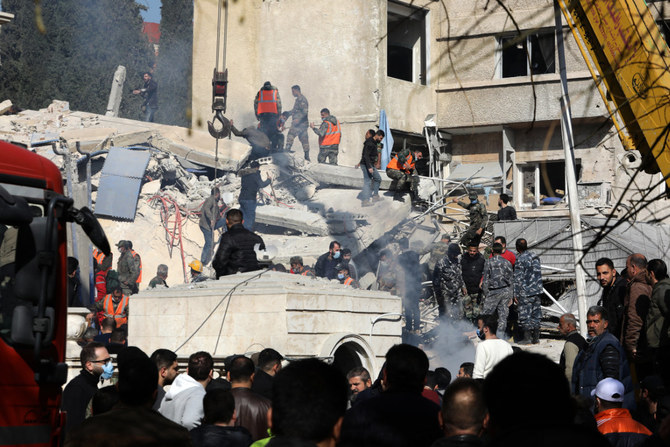
- A security source said the strike hit a building operated by government forces
- Defense ministry acknowledged only that the strike caused some material damage
An Israeli airstrike on the outskirts of Damascus injured eight Syrian military personnel late on Thursday, the Syrian defense ministry said, the latest such attack amid the war in Gaza.
The Israeli strike, launched from the occupied Golan Heights toward “one of the sites in the vicinity of Damascus,” caused some material damage, the Syrian defense ministry said in a statement.
The strike hit a building operated by Syrian security forces, a security source in the alliance backing Syria’s government earlier told Reuters.
The Israeli military said it does not comment on reports in the foreign media.
Israel has for years been striking Iran-linked targets in Syria and has stepped up its campaign in the war-torn country since Oct. 7, when Iran-backed Palestinian militants Hamas crossed into Israeli territory in an attack that left 1,200 people dead and led to more than 250 taken hostage.
Israel responded with a land, air and sea assault on the Gaza Strip, escalated strikes on Syria and exchanged fire with Lebanese armed group Hezbollah across Lebanon’s southern border.
The security source said the location struck in Syria on Thursday sat just south of the Sayyeda Zeinab shrine, where Hezbollah and Iranian forces are entrenched.
But the source said the site struck was not operated by Iranian units or Hezbollah.





